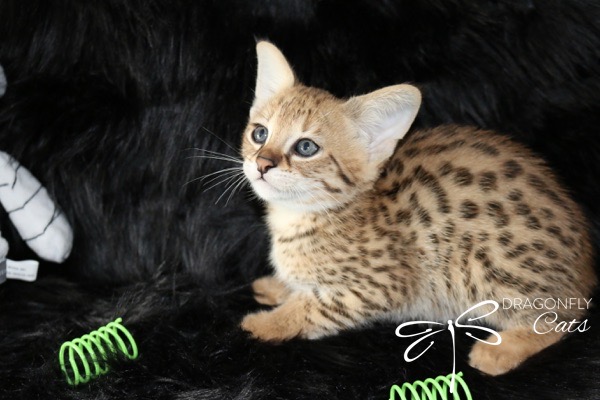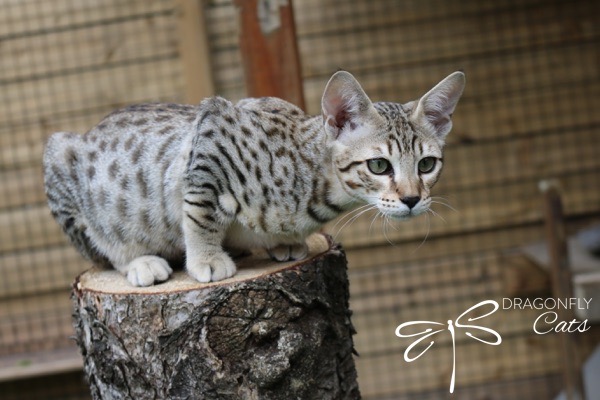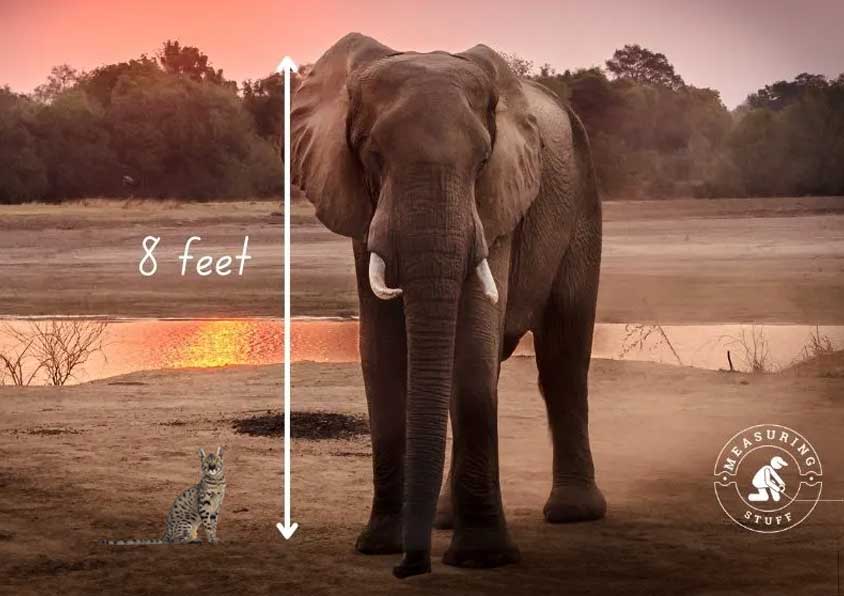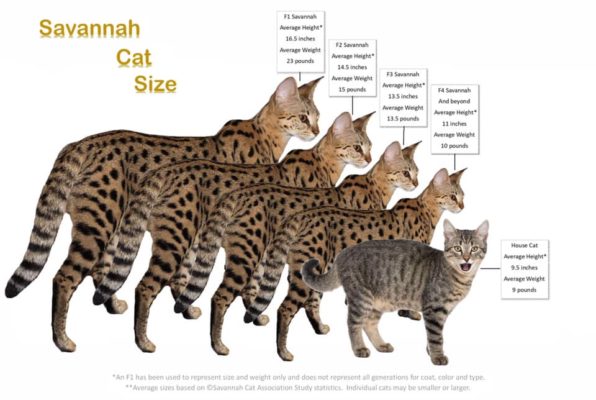What is a Savannah cat?
The Savannah cat is a hybrid between a domestic cat (Felis catus) and a serval (Leptailurus serval). Savannah cats are classified by the quantity or percentage of wild blood they contain. Breeding a domestic household cat with a beautiful exotic animal such as the African serval requires caution, skill, care, and a lot of attention.
Savannahs are known for their long legs, slender bodies, large ears, long necks, short tails, and, of course, their exotic spots. They weigh between 10 and 30 pounds.
Savannah’s personality is playful, adventurous and Loyal. Unlike most cats, they love water and can even be trained to walk on a leash and play fetch. They are super friendly and love dogs, cats and kids.

What is a Savannah cat’s temper?
Highly Intelligent
These cats are incredibly smart; they can open doors, cabinets, and drawers, unzip items, turn on water faucets, and learn basic dog commands like sit, stay, lay, and jump, among others. They are always on the edge and need to explore and push their limits.
Talkative
They love to talk. Although not all of them are vocal, most are. They can express themselves and will let you know if they want something from you.
Water
Savannah cats love water! As soon as you are near a running water source in your home, they will surround you.

Walks
Savannah cats enjoy going outdoors for a walk on a leash or in a catio. They relish being in nature. If you have the space, ensure they are secure, as they have a tendency to run and love to explore. NEVER LET THEM ROAM FREELY UNATTENDED; THEY MAY NOT RETURN IF THEY VENTURE BEYOND YOUR PERIMETER.

How high can a Savannah cat jump?
Savannah cats are renowned for their remarkable jumping ability. Reports indicate that they can leap as high as 7 to 8 feet vertically from a standing position. Their agility and athleticism stem from their heritage as a crossbreed between domestic cats and servals, wild African cats celebrated for their jumping prowess.
Taking care of tour Savannah cat
Litter box training
Yes, Savannahs maintain good hygiene and learn litter box habits from their mother. All kittens are fully litter box trained before leaving the cattery. Keep in mind that kittens are like “toddlers”; if given a large space with plenty of freedom, they may have accidents. They can become so engrossed in play that they forget they need to go until it’s too late. Therefore, in the beginning, frequently take them to their litter box and encourage them to go potty. They will quickly learn where the box is.
Start them in a small room or bathroom to help them get used to their new space. Then, give them more freedom once you feel they are comfortable. Keep reminding them a few times each day where the litter box is until they are fully settled in their home. If a kitten has litter box issues, there is likely a reason, such as a bladder infection or something that prevents him from using his potty safely.
Do they require vaccines like any other cats?
Kittens should receive their first veterinary visit and set of vaccines by 10 weeks of age. It is the owner’s responsibility to get the remaining boosters. We recommend three types of vaccines: live modified or killed. Here at Dragonflycats, we prefer the live modified option, as we have had great success with it and encountered few adverse reactions or side effects.
We don’t vaccinate against feline leukemia or AIDS since our cattery has tested negative. It has been reported that these vaccines have many severe side effects in our breed, so for all these reasons, we don’t recommend them.
Is there a waiting list?
Savannah kittens are in high demand, so it is very likely you will have to wait until new litters are born to get exactly what you want. This seems particularly true for the early generations, as not many breeders are devoted to producing them. Since they are hard to breed and females give small litters, the quantity of early generations is limited on an annual basis. You may also have to wait if you are specifically interested in a kitten from a particular pairing.
We require a deposit to add your name to our waiting list, and it is not unusual to wait up to 12 months before the kitten of your choice becomes available. You may decide that you cannot wait and purchase a cat from another breeder. As a courtesy, please notify the breeders who have added you to their wait lists if you change your plans so that the next person on their lists can have the opportunity to purchase.
Deposits are non-refundable because we use them to maintain our cattery, and without a deposit, we cannot produce kittens.
When are kittend ready to go home?
Breeders typically place their kittens in new homes between 10 and 14 weeks of age. We usually place our kittens with their new owners at 10 to 12 weeks of age, depending on the generation and the individual kitten’s developmental stage. Kittens may be kept longer if they have had difficulty weaning or are not showing consistent litter box use.
Are all kittens registered?
Yes. The International Cat Association (TICA) accepts Savannahs for registration and show. All our cats are TICA registered. We will provide a breeder slip registration with the microchip number
Do Savannah cats get along with other animals (i.e. dogs, other cats, birds, bunnies, etc...)?
Most of them get along quite well, but introducing a Savannah or any animal into a home with other pets can be intimidating and may cause them to act standoffish. However, most adjust quickly and become buddies in no time.
Savannahs NEED play mates!
Having a dog or a savannah cat is the best choice. Some cat breeds can work, but usually, regular domestic cats can’t keep up with the energy of savannahs and become annoyed.
Vet Care
Please inform your veterinarian that you are purchasing a hybrid feline, so they can prepare and educate themselves.
For your new kitten, Savannah Cats may have smaller-than-average livers due to their Serval ancestry, increasing the risk of side effects from certain medications. Your veterinarian should exercise caution when using specific medications for surgical procedures. An isoflurane gas or an injectable anesthetic protocol tailored for exotic or hybrid-bred felines should be utilized.
Your veterinarian is always encouraged to consult with our cattery veterinarian before any procedures. Please feel free to contact us for more information if needed.
•All our Savannah cats are tested with UC Davis and MyCatScan.
•We test for Piruvate Kinase Deficiency (PK Def).
•Pyruvate kinase deficiency in cats is an inherited hemolytic anemia that is passed down from parents to offspring. An affected feline has a deficiency of the regulatory enzyme pyruvate kinase, which is essential for the energy metabolism required to produce more red blood cells.
•We also test for the Pra-Cep290 and Pra-CRX.
•Progressive retinal atrophy (PRA) is a group of degenerative diseases that affect these photoreceptor cells. With this disease, the cells deteriorate over time, eventually leading to blindness in the affected cat.
•We also run pro-BNP tests with IDEXX for heart problems, and our cats are scanned for HCM.
•Our cattery tests negative for Tritrichomonas foetus, Giardia, and Coccidia.
•All our cats are also harmful to feline and leukemia.

Image Source : https://savannahcatassociation.org/savannah-cat-size/
Different Generations
There are various numerical and alphabetical variations used to classify the different Savannah cats. The Savannah is designated by its ‘F’ generation, with ‘F’ standing for ‘filial,’ which indicates how many generations it is removed from the wild ancestor, the Serval. An F1 is one generation away from the Serval (having a Serval parent), an F2 is two generations removed (with a Serval grandparent), and so forth.
*F1 = 57% Serval- one parent will be a serval
*F2 = 35% Serval – one grandparent will be serval
*F3 = 21% Serval – one great grandparent will be Serval
*F4 = 16% Serval – one great-great grandparent will be a Serval
*F5 = 11% Serval – One great great great grandparent will be Serval
What is an SBT
SBT stands for Stud Book Traditional. An SBT is bred from its ancestor, the Serval, until it reaches 4 generations apart. It is a fully domesticated animal that retains the wild appearance of its ancestor without the disadvantages of a wild animal.
Letter coding- What does A, B, C & SBT mean?
This pertains to when outcrosses (non-Savannah domestic cats) are included in a pedigree. This is significant because mating two different species frequently leads to fertility problems. For instance, mating a horse with a donkey results in a mule, which is sterile and cannot reproduce. In the feline realm, mating two different species, such as the Serval and a domestic cat, results in only male offspring being sterile until around the fifth generation.
• A means that one parent is a (non-Savannah) domestic outcross
• B means that both parents are Savannahs
• C means that both parents and grandparents are all Savannahs
• SBT means that parents, grandparents, and great-grandparents are all Savannahs.
An SBT is bred from the Serval but is at least four generations removed. The SBT Savannah is a “pure” Savannah that has had only Savannahs as parents for at least three generations. The size and appearance of an SBT Savannah can be compared to those of an F4 or an F5 Savannah. SBT Savannahs are more consistent in their type, with personality and size being more predictable, and their temperament is also reliable. An SBT Savannah is the perfect choice for a family with other pets and small children.
Other questions you might have
Are Savannah cats legal in Canada?
Savannah cats are legal in every province in Canada. However, certain generations are not. We suggest you contact the wildlife authority in your province to make sure that Savannah cats are legal there.
Are Savannah cats hypoallergenic?
As with most cats, Savannahs are not considered hypoallergenic. In fact, almost no cats are hypoallergenic. Why? Because allergies can be caused by a variety of factors. Some people are allergic to a cat’s saliva, while others may be allergic to fur or other elements.
How much are Savannah cats?
Establishing a quality breeding program requires a significant upfront financial investment. Additionally, proper care for all the cats must be provided daily. Besides the initial investment, there are challenges associated with breeding hybrids; the higher the percentage of wild ancestry, the more difficult they are to breed. Servals are entirely wild animals with special needs in terms of housing, caging requirements, diet, and healthcare. Caring for pure servals and mating them with domestic savannahs is costly, time-consuming, tricky, and demanding, but it is also rewarding.
It takes many years, luck, and skill to mate a Serval with a domestic cat. Only a few breeders worldwide have succeeded. If mating occurs, there are still many risks. Due to the gestation difference between the Serval and domestic cat (about a 10-15 day difference), all F1s are born premature. Some are too weak to survive and require 24 hours of care from the breeder to ensure survival. Additionally, their litter are generally small, averaging between 1 to 3 per litter.
When it comes to producing F2, there are similar challenges. Not all females will accept smaller males, and they have to, as genetically speaking, males are sterile from F1 to F4. The challenge also lies in the size difference; a large female and a small male make the act of breeding physically difficult. Sometimes, females can also be moody and aggressive toward the male, which can hinder the male’s attempts to mate with the female. When breeding succeeds, F2 litters are usually quite small, averaging 1-3 kittens. We, as breeders, spend countless hours on our cats to ensure their health, safety, and socialization. Additionally, feeding costs can add up significantly by the end of the month. The difficulties in breeding savannahs and achieving success are why they are so expensive.
A savannah cat is more than just a pet; it’s a family member. Here at Dragonflycats, we are working hard to provide you and your family with a beautiful, healthy, and intelligent companion for the coming decades. That’s why our prices vary from one generation to another. For more details about the prices, please contact us directly, and we will gladly answer all of your questions.
Are Savannah cats legal in USA?
Please check your local animal control to make sure this information is correct.
Illegal states in USA :
• Rhode Island
• Hawaii
• Nebraska
• Georgia
Restricted States :
• Texas – bans in many counties and completely Illegal in some.
• Colorado – Illegal in Denver
• Alaska – F4 and later only
• Iowa – F4 and later only
• Vermont – F4 and later only
• New Hampshire – F4 and later only
• Massachusetts – F4 and later only
• Delaware – F4 and later only with a permit
• Maryland – Limited to 30 lbs and under
• New York – F5 and later only (Illegal in Queens, Manhattan, Bronx,Brooklyn, Staten Island)
How big do they get?
There is no guarantee on size, but there is a general expectation per generation. These are rough averages :
• F1 range 18-30lbs
• F2 range 15-30lbs
• F3 range 12-20lbs
• F4 range 12-18lbs
• F5 range 11-16lbs
• F6 range 10-15lbs
• F7 range 10-15lbs
Why shouldn't I get a discounted cat?
A cat is not an accessory. It’s a living, breathing creature with complex needs and emotions. This is one of the main reasons why it’s important to get a healthy cat that has been bred in a way that minimizes the likelihood of serious health issues or behavioral and temperament problems. The money you save on a ‘discount’ cat may not actually be savings at all. If the pricing seems too good to be true, it usually is. There are many scammers out there.
Additionally, buying a discounted cat could lead to significantly higher expenses in veterinary bills and training. Plus, consider the emotional toll of sharing your life with a cat that suffers from poor health or has an unpleasant temperament. Acquiring a Savannah cat is different from adopting one from a shelter or a friend; this is an entirely new breed, which means that opportunists might take advantage of potential owners’ naivety. The consequences can be severe.
If you understand the value of savannah cats, you need to carefully research your options and choose a breeder who is truly committed to the cats’ welfare. Don’t allow yourself to be taken advantage of.
You need to learn more? You need help choosing the right companion cat? Contact us.

Thank you!